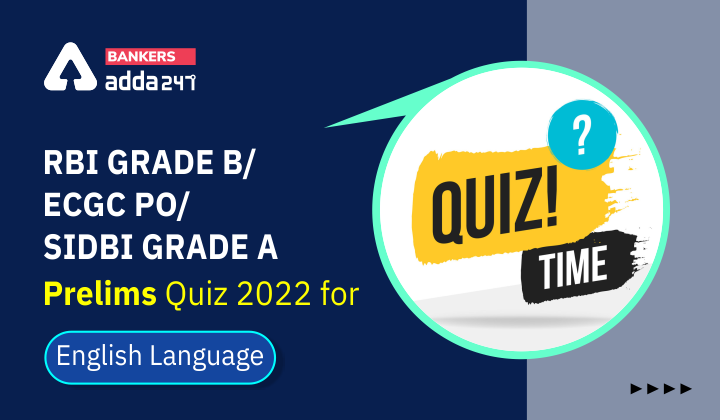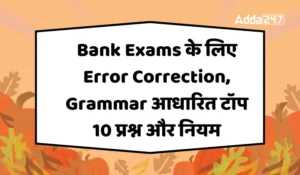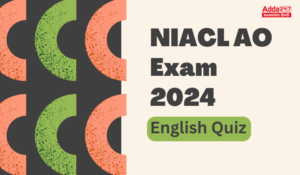
TOPIC: ERROR
CORRECTION
Directions
(1-15): Read
each sentence to find out whether there is any grammatical or idiomatic error
in it. The error, if any, will be in one part of the sentence. The number of
that part is the answer. If there is ‘No error’, the answer is (E). (Ignore
errors of punctuation, if any.)
Q1. He is so lazy (A)/ that he
takes a (B)/ large number of time (C)/ to complete such a small piece of work.
(D)/ No error. (E)
(a) A
(b) B
(c) C
(d) D
(e) No Error
Q2. Dileep has spend (A)/ six
years in Calcutta (B)/ but still does not know (C)/ many parts of the city.
(D)/ No error. (E)
(a) A
(b) B
(c) C
(d) D
(e) No Error
Q3. Last week when (A)/ I reach
Viru’s house (B)/ he had already (C)/ left for Mumbai. (D)/ No error. (E)
(a) A
(b) B
(c) C
(d) D
(e) No Error
Q4. The number of foreign
tourists (A)/ visiting India are increasing (B)/ day by day during (C)/ this
tourist season. (D)/ No error. (E)
(a) A
(b) B
(c) C
(d) D
(e) No Error
Q5. After 50 years of
Independence (A)/ many social problems (B)/ still remaining (C)/ to be solved
in India. (D)/ No error. (E)
(a) A
(b) B
(c) C
(d) D
(e) No Error
Q6. Facing adversity (A)/ early
in the life is linked (B)/ with more physical pain (C)/ in adulthood (D). No
error (E).
(a) A
(b) B
(c) C
(d) D
(e) No Error
Q7. We got the beaver (A)/ far
back down the bridge (B)/ so we hoped it would just keep going(C)/ before it
got to the other side. (D)/ No error (E).
(a) A
(b) B
(c) C
(d) D
(e) No Error
Q8. The Russian President (A)/
begins a new term (B)/ with huge economic (C)/ and foreign policy challenges
(D)/ No error (E)
(a) A
(b) B
(c) C
(d) D
(e) No Error
Q9. British schools are (A)/
replacing analog clocks (B)/ with digital one to (C)/ help clueless students
(D)/ No error (E)
(a) A
(b) B
(c) C
(d) D
(e) No Error
Q10. Court hears claims (A)/
that mistakes done by (B)/ armed raiders link men(C)/ on trial to crime (D)/ No
error (E)
(a) A
(b) B
(c) C
(d) D
(e) No Error
Q11. There are indications that
(A)/ freelancing will become so integral (B)/ to businesses that a new term
will (C)/ probably have to be coined for it(D)/ No error (E)
(a) A
(b) B
(c) C
(d) D
(e) No Error
Q12. We know fortunately that
(A)/ China’s leadership is aware of these potential risks – (B)/ as well as the
proven strategies (C)/ that can help address the challenges(D)/ No error (E)
(a) A
(b) B
(c) C
(d) D
(e) No Error
Q13. The train (A)/ had left
before (B)/ he had reached (C)/ the station. (D)/ No error (E).
(a) A
(b) B
(c) C
(d) D
(e) No Error
Q14. Rising inflation and the
huge cost (A)/ of training a workforce are reasons (B)/ why companies are
tapping (C)/ into the gig economy. (D)/ No error (E).
(a) A
(b) B
(c) C
(d) D
(e) No Error
Q15. Second Transplants (A)/
Can Be (B)/ equally successful as successful as (C)/ Primary Transplants (D)/
No error (E).
(a) A
(b) B
(c) C
(d) D
(e) No Error
Solutions:
S1. Ans. (c)
Sol. Use ‘lot’ in place of
‘large number’ as ‘a large number of/ a number of’ is not used with uncountable
noun ‘time’.
S2. Ans. (a)
Sol. ‘spent’ will be used in
place of ‘spend’ as ‘have/ has/ had/ having+ V3’ is used.
S3. Ans. (b)
Sol. ‘reached’ will be used in
place of ‘reach’ as the sentence is in past tense.
S4. Ans. (b)
Sol. ‘is’ will be used in place
of ‘are’ as singular verb is used after ‘The number of’.
S5. Ans. (c)
Sol. ‘are still’ will be used
in place of ‘still remaining’ as plural verb ‘are’ is used for ‘many social
problems’
S6. Ans.(b)
Sol. ‘The’ will not be used
before ‘life’ as ‘life, science, man, woman’ when used for comprehensive
meaning then we don’t use an article before it. However, when these words are
used for some specific purpose we can use an article before it.
For example:
Aman leads a happy life.
S7. Ans.(a)
Sol. The error is in part (a)
of the sentence. Use ‘we had got’ in place of ‘we got’ as when we talk about
the two incidents of the past then for the event which took place earlier we
use’ Past Perfect’ and for the event which took place later we use simple past.
S8. Ans.(e)
Sol. There is no error in the
given statement.
S9. Ans.(c)
Sol. Replace ‘ones’ with ‘one’
as one is used for singular noun and ‘ones’ is used for plural noun.
S10. Ans.(b)
Sol. Th error is in part (b) of
the sentence as ‘made’ should be in place of ‘done’ as ‘make a mistake’ is
idiomatic. A ‘mistake made’ will be correct if it is used in the passive voice.
S11. Ans.(e)
Sol. There is no error in the
given statement.
S12. Ans.(a)
Sol. The error is in part (a)
of the sentence.
‘Fortunately,’ will be used at
the start of the sentence because the adverb which tells us about the specialty
of the sentence is used generally at the start of the sentence.
Example—–
Unfortunately, he was wounded in the war.
S13. Ans.(c)
Sol. The error is in part (c)
of the sentence.
Remove ‘had’ as we need to use
only simple past.
The work which is completed
first must be written in Past Perfect i.e., (subject +had + v3 ) which becomes
THE TRAIN HAD LEFT.
The work which is completed
after must be written in SIMPLE PAST i.e., (subject+ v2 + object) which becomes
HE REACHED THE STATION.
S14. Ans.(e)
Sol. There is no error in the
given statement.
S15. Ans.(c)
Sol. There is an error in part
(c) of the sentence.
The use of “equally successful”
is superfluous as “as successful as” implies the same meaning.


 Practice for English Section: 15 Cloze T...
Practice for English Section: 15 Cloze T...
 Bank Exams के लिए Error Correction, Gram...
Bank Exams के लिए Error Correction, Gram...
 English Quiz For NIACL AO Mains 2024 Exa...
English Quiz For NIACL AO Mains 2024 Exa...










